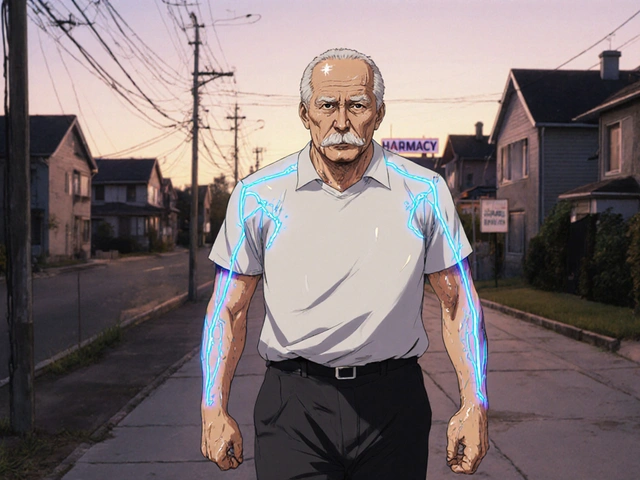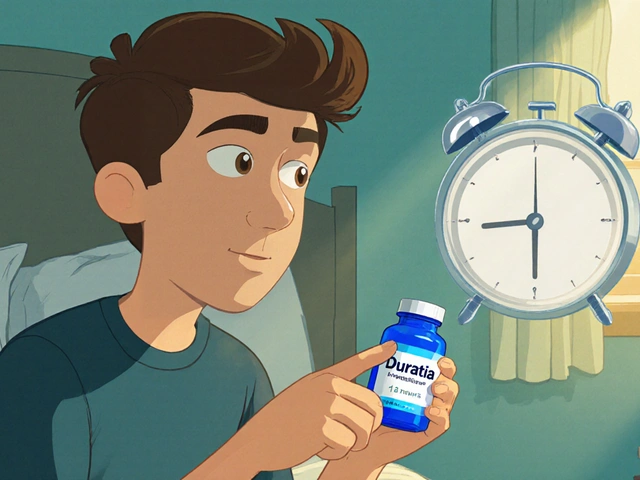Alpha Blockade: Simple Guide to How Alpha‑Blockers Work
Ever wonder why a pill can lower blood pressure or help you pee more easily? The secret is alpha blockade. It means the drug blocks alpha‑adrenergic receptors, the tiny switches on blood‑vessel walls and the prostate. When those switches are turned off, muscles relax, blood flows better, and the bladder empties more smoothly.
What Is Alpha Blockade?
Alpha‑adrenergic receptors come in two main flavors: alpha‑1 and alpha‑2. Most alpha‑blockers focus on the alpha‑1 type because it’s the one that makes blood vessels tighten up. A drug that blocks alpha‑1 stops the tightening signal, so the vessel walls stay relaxed. The result is lower blood pressure and less resistance for blood to move around.
In the urinary tract, alpha‑1 receptors also sit in the smooth muscle of the prostate and the neck of the bladder. Blocking them makes that muscle loosen, which helps men with an enlarged prostate (BPH) empty their bladder more fully. That’s why you’ll see alpha‑blockers prescribed for both hypertension and BPH.
When Do Doctors Prescribe Alpha‑Blockers?
Doctors reach for alpha‑blockers for a few common reasons:
- High blood pressure – especially when a patient can’t tolerate other meds.
- Benign prostatic hyperplasia (BPH) – to reduce urinary urgency and nighttime trips.
- Raynaud’s phenomenon – to improve blood flow to fingers and toes.
Typical brand names you might hear are **Flomax**, **Cardura**, and **Minipress**. The generic versions (like tamsulosin, doxazosin, prazosin) work the same way but cost less.
Most alpha‑blockers are taken once a day, often after a meal to lower the chance of a sudden drop in blood pressure (called orthostatic hypotension). If you feel dizzy when you stand up, that’s a sign the dose might be too high.
Side effects are usually mild. The most common are:
- Dizziness or light‑headedness
- Headache
- Runny nose
- Weakness
Serious problems like a fast heartbeat or severe low blood pressure are rare, but they can happen, especially if you mix the drug with other blood‑pressure medicines.
Here are a few practical tips if you or someone you know is starting an alpha‑blocker:
- Stand up slowly from sitting or lying down.
- Avoid alcohol while adjusting to the medication.
- Keep a water bottle handy; dehydration can make dizziness worse.
- Check in with your doctor if you notice a sudden drop in blood pressure or a new heart rhythm issue.
Alpha‑blockers are not a cure‑all. They work best when combined with lifestyle changes like a low‑salt diet, regular exercise, and weight control. For BPH, staying active and limiting caffeine can also ease symptoms.
In short, alpha blockade is a straightforward way to relax smooth muscle, whether that muscle lines blood vessels or the prostate. Understanding how the drugs work helps you spot benefits, watch for side effects, and use them safely. If you’re curious about whether an alpha‑blocker fits your health plan, talk to a pharmacist or your doctor – they can match the right dose to your specific needs.
Pheochromocytoma Chronic Pain Management: Proven Strategies to Relieve Discomfort
By Joe Barnett On 24 Sep, 2025 Comments (20)

Learn practical ways to control chronic pain caused by pheochromocytoma, from medication choices to lifestyle tweaks and surgical options.
View More



